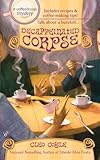 I am always on the lookout for a good mystery. And there is nothing better than a good academic mystery to whet my whistle. So, I was thrilled to find Sally Wright's new academic mystery series. I picked up the first book in the series Publish and Perish and just finished it.
I am always on the lookout for a good mystery. And there is nothing better than a good academic mystery to whet my whistle. So, I was thrilled to find Sally Wright's new academic mystery series. I picked up the first book in the series Publish and Perish and just finished it.It was good. It was different. I enjoyed it. But, I'm not going to jump right out tomorrow and buy the rest of the series. So what is stopping this series from being amazing? Mostly, the style of writing. It just doesn't flow. The characters are quintessential academics and talk with a lot of long wordy phrases that just don't roll off the tongue. There is something to be said for accuracy and it would have been more disturbing if the 40-somethings had thrown around "dude." But nonetheless, I found it took me a fair amount of time to get into the groove with this book. And more than that, I did not have much sympathy for any of the characters. They are not loveable, they are not empathetic, they are, honestly, kind of boring. (I'd hate to think all academics are like that; I know a fair number with spunk.)
Plus, the author sets up the plot as though the murderer is obvious. It was too obvious, but for quite a while I wondered why I was reading because she had already determined who the killer was. Okay, so I was wrong, but there was not a lot to keep me going, to keep me suspecting that maybe I was wrong. And as soon as I realized it wasn't the obvious killer than the second in line was pretty equally obvious. The desire to solve the mystery along with the sleuth was missing in this book.
All in all, I did like the main character, Ben Reese. As a World War II veteran with an interesting past, he has merit as a long term sleuth. I think Wright could go a long way into delving into Reese's background and his future. I might pick up more of the series purely based on the main character. But, as I said before, I'm not running out tomorrow. Maybe when my bookcase gets significantly emptier than it is now.




